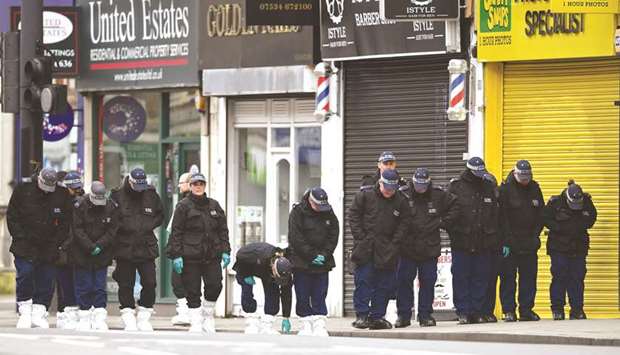Prisoners already jailed for terrorism offences could face retrospective changes to their sentences to deny them early release, after a man just freed from jail carried out a knife attack in south London, Boris Johnson has said.
Speaking at the end of a speech mainly concerned with Brexit, the prime minister said the government could go down the potentially legally tricky route of changing release conditions for those already in jail, following two recent incidents.
Sudesh Amman was shot dead by police in Streatham on Sunday after stabbing two people. The 20-year-old had been freed after serving half of his sentence of more than three years for the possession and distribution of extremist material and was under active police surveillance. The attack left one person initially in a life-threatening condition.
After a man with a similar sentencing history killed two people at London Bridge in November, Johnson promised to change the law to end automatic early release for those convicted of terrorism offences.
He yesterday said this could now be applied to those already in jail.
“The difficulty is how to apply that retrospectively to the cohort of people who currently qualify,” the prime minister said. “We do think it’s time to take action to ensure that people, irrespective of the law we’re bringing in, people in the current stream do not qualify automatically for early release, people convicted of terrorist offences.
“I hope people understand that the anomaly we need to clear up is the process by which some people are still coming out under automatic early release without any kind of scrutiny or parole system.” More details would emerge soon via the Justice Secretary, Robert Buckland, Johnson added.
Answering a question about how people could be reassured, Johnson said the aim was that no one jailed for terrorism should be released “without some process of parole or scrutiny by real experts in the matter – cynical, hardened people who can look into their eyes and really think whether or not these people again pose a danger to the public”.
Speaking earlier, the chief secretary to the Treasury, Rishi Sunak, rejected the idea that cuts to prison and probation services had made it harder to rehabilitate or monitor terrorism suspects.
He told BBC1’s Breakfast: “The counter-terrorism budget, which is what we’re dealing with here, has actually been increased every year for the last five or six years.
“It is now up 30% or 40% from where it was several years ago. And we just announced a 10% increase, taking it to almost £1bn for the forthcoming year.”
He said the government was doubling the number of specific counter-terrorism probation officers and creating new places in probationary hostels. “This is all forming part of the plans that we’re putting in place to keep people safe.”

Police officers conduct a search on Streatham High Road in south London yesterday. Police yesterday also searched two homes.
